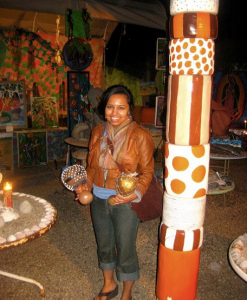The Center for Advanced Amazonian Studies
Podcast for the MIISRadio
Title: Globalization Issues of the Amazon Region of Brazil
April 11, 2016

Hi everyone, thanks for tuning into this podcast. My name is Anita Joshi and I am a student at MIIS in the MPA program. Today I’d like to share a bit about my recent experience in Brazil this Spring.
The main reason for my trip was to do an internship during Spring Break and the week before, with the NGO, the Center for Advanced Amazonian Studies, or CAAS. The organization works to promote integrated solutions to social and environmental issues and participatory models of environmental sustainability. During this internship, I also did research for my independent project, and spent much of my time collecting data for my IDSP fellowship project on the stories of local empowerment in indigenous communities engaged in sustainable agriculture, in particular those that are growing indigenous crops such as guarana and acai fruit. I mainly interviewed artisans and farmers we relied on indigenous crops for their livelihoods.
Over the next 5 years, the Brazilian government is poised to address biodiversity conservation, climate change mitigation, and poverty alleviation in the Amazon. The booming global market for açaí presents a key opportunity in this equation. Açaí is a native palm of the Amazon floodplain forest
primarily cultivated by traditional communities. Right now, however, there is a disconnect: why, given the thriving açaí market, have we not seen greater socioeconomic development in these communities? The aim of my project and work with CAAS was to fill the knowledge gap by analyzing the açaí fruit value chain and its impact on communities, thus shedding light on how forest economies can promote conservation in tropical regions.
As a state party to the UN Convention on Biological Diversity and the Bilateral U.S.-Brazil Tropical Forest Conservation Act, the Government of Brazil is committed to cutting Amazon deforestation by 80% by 2020, while reducing poverty and improving livelihoods. To meet these mandates, Brazil has
implemented the federal Action Plan for the Prevention and Control of Deforestation in the Legal Amazon. One component of the Plan targets development of a sustainable forest economy. A staple food for Amazon communities, açaí is one of the Amazon’s most abundant and flood-adapted native species and ideal for a sustainable forest-based economy. It grows mainly in protected areas poorly suited to most other crops due to flooding. Thus, it plays a vital role in estuarine ecosystems while providing an economic alternative to deforestation.
Açaí fruit also gained international attention for its remarkable health benefits, recently entering mainstream food establishments such as Jamba Juice. Back in the Brazilian Amazon, however, the açai fruit has played an important role for the people of the region, known as caboclos or ‘forest spirits,’ long before it appeared in Jamba Juice. Their legends tell the story of how the fruit saved the people of the Amazon from a great famine. Only time will tell if acai economy can bring social change to the impoverished northeast Amazon region. As anthropologist and açai expert Eduardo Brodizio stated, “The evolution of the açai fruit production system provides an opportunity not only to address
themes of regional and national importance, but also … of international relevance.”
This project allowed me to apply the tools and knowledge I have gained through on-campus instruction in the field. While I was at my field site, I was able to apply the key competencies of the IDSP fellowship, including inductive research, reflection, and digital media. By practicing inductive research for my data collection, I was able investigate how different methods can be used tell a richer story. Overall, I believe this experience has enhanced my intercultural competency, a vital skill for international professionals. This field experience has also helped me gain a greater depth of knowledge in my area of focus, sustainable development in the Amazon region. My ultimate goal is to
start my own organization to work on sustainable development in indigenous communities in the Amazon.
Thanks for joining me today for this podcast and thanks for listening! See you next time!



You must be logged in to post a comment.